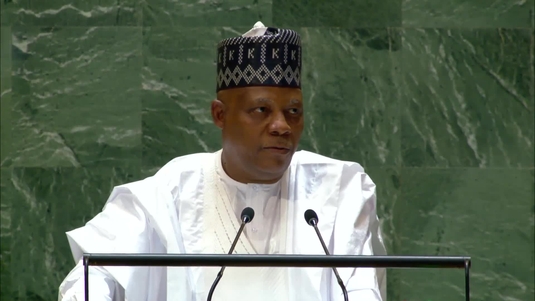Nigeria brought an ambitious agenda to the 80th session of the United Nations General Assembly.
Vice-President Kashim Shettima made a list of requests on Wednesday, speaking on behalf of the nation, covering topics ranging from economic opportunity to global governance.
According to reports, Nigeria would address the Palestinian statehood discussion, push for changes to the global banking framework, and demand representation in the UN Security Council before the debate.
The vice president campaigned for those reforms, emphasizing how important they were to the future of Africa and the stability of the global system.
It emphasized the main points of Shetimma’s speech.
UN COUNCIL SEAT DEMAND
Shettima criticized the UN’s “slow pace of progress” at the beginning of his remarks.
He clarified that the alarming indicators had compelled countries to reject the multilateral institution’s impartiality and tasked the international organization with implementing effective reforms.
Shettima contended that Nigeria’s permanent representation at the UN Security Council is one of the modifications.
“Our demand for a permanent seat at the Security Council is a call for justice, representation, and reform that restores credibility to the very institution upon which the hope of multilateralism rests. We are a stabilizing force in regional security and a reliable partner in global peacekeeping.”
Because we choose tolerance to oppression, terrorists hate us. Their goal is to use hateful speech to split us apart and contaminate our humanity,” he stated.
EQUALITY IN THE MINING OF MINERAL
The vice president scowled at the continent’s unethical mining practices, complaining that they leave African countries in poverty.
Shettima acknowledged that foreign investments provide a means of escaping degradation, but she also pointed out that African nations must gain from the process.
In Nigeria, we are aware that when communities with access to essential resources are able to reap the benefits of those resources, we are more stable. This has been our experience in the Niger Delta’s oil-producing region,” he stated.
“When those nations that produce strategic minerals fairly benefit from those minerals — in terms of investment, partnership, local processing, and jobs,” he stated, “I think we will strengthen the international order.”
FORMING THE DIGITAL PARTY
Shettima also argued that Africa should be included in technology developments to close the digital divide by establishing a “dedicated initiative” that would unite communities, governments, the commercial sector, and scholars.
We are still feeling the effects of the information and communication revolution of the last two decades, he continued, as we stand on the precipice of new and significant technological transformation.
We are more aware than we were of the advantages that technology presents and the precautions that must be taken to promote development and lessen the risk of corrosion. Fake news worries some people. We have an abundance of that, which might have disastrous real-world repercussions in both wealthy and impoverished nations.
FORMATION OF THE WORLD FINANCE COURT
The second demand was for policies that would supervise the reorganization of the architecture of global finance.
According to Shettima, many nations are weighing the costs of the new global order as a result of the world’s security situation becoming more challenging.
“We in Nigeria are already accustomed to making such tough decisions: defense platforms or infrastructure renewal? tanks or schools.
“If we can access reforms to strengthen the international financial architecture, we can take that progress to the next level, a level that presents new opportunities for trade, investment, and profit,” he continued.
The issue of climate change is not abstract.
Shettima had a different position from US President Donald Trump who termed climate change the “greatest con job” of all time.
By tackling climate change, the vice-president urged the UN to reconsider how best to spend its limited resources.
“It is not a hypothetical matter concerning an uncertain destiny, to be resolved at a later date,” he stated.
CONDEMNATION OF ISRAEL, SUPPORT FOR PALESTINE
Since 1988, Nigeria has recognized Palestine as a state. Shettima, however, joined the resounding appeal for a two-state solution at the UNGA.
The larger region is scarred by tensions, he said, denouncing Israel’s attack in Gaza.
We don’t think the value of human life should be confined to the hallways of never-ending discussion. For this reason, we state unequivocally and without reservation that a two-state solution is still the most respectable way for the Palestinian people to achieve enduring peace.
“A civilization seeking order does not consider the Palestinian people to be collateral damage.” “They deserve the same freedoms and dignity that the rest of us take for granted because they are human beings with equal worth,” he said.

